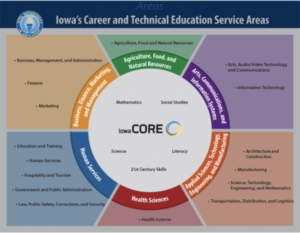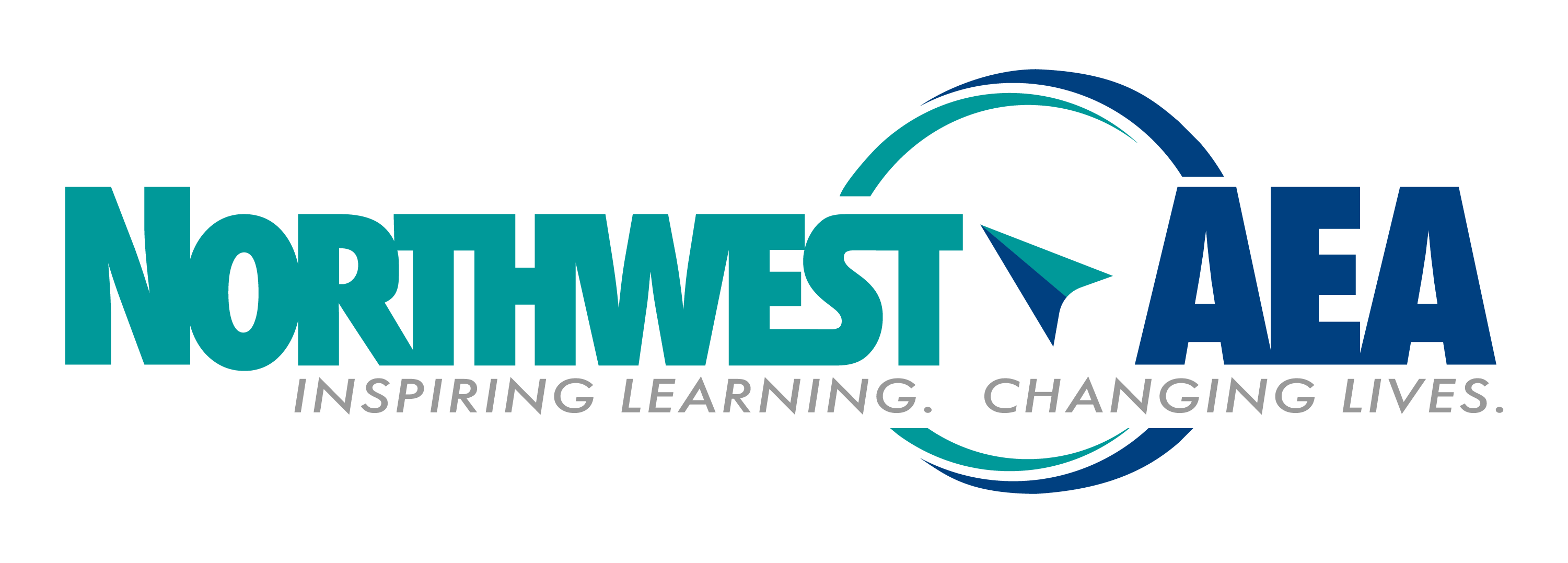Career and Technical Education (CTE) in Iowa includes educational programs offering a sequence of courses that prepare individuals for employment in current or emerging occupations. Programs include competency-based applied learning, which contributes to an individual’s academic knowledge, higher-order reasoning and problem-solving skills, work attitudes, general employability skills, and occupational-specific skills. CTE broadly encompasses six service areas:
- Agriculture, Food, and Natural Resources
- Applied Sciences, Technology, Engineering, and Manufacturing (including transportation, distribution, logistics, architecture, and construction)
- Business, Finance, Marketing and Management
- Health Science
- Human Services
- Information Solutions, Arts, and Communications
2024-25 District Requirements and Important Dates
Program Overview
Career and Technical Education (CTE) in Iowa includes educational programs offering a sequence of courses that prepare individuals for employment in current or emerging occupations. Programs include competency-based applied learning, which contributes to an individual’s academic knowledge, higher-order reasoning and problem-solving skills, work attitudes, general employability skills, and occupational-specific skills.

Service Areas:
- Agriculture, Food, and Natural Resources
- Arts, Communications, and Information Systems
- Applied Sciences, Technology, Engineering, and Manufacturing (including transportation, distribution, logistics, architecture, and construction)
- Business, Finance, Marketing, and Management
- Health Sciences
- Human Services
State law requires schools to offer 4 of the 6 service areas to their students under Chapter 12 “offer and teach” requirements.
There are 3 units of instruction required for each program of study. One unit of instruction may be shared between programs.
Teachers must have a CTE endorsement in the area they are teaching.
If your district is adding a new CTE program offering, please contact Chris Dicus at Northwest AEA.
Resources by Program
Agriculture, Food, and Natural Resources
- Agriculture Education Vision & Mission
- Agriculture, Food, and Natural Resources: Standards & Benchmarks (Iowa)
Career and Technical Student Organization (CTSO):
Professional Organizations:
Arts, Communications, and Information Systems
Applied Sciences, Technology, Engineering, and Manufacturing
Applied Sciences, Technology, Engineering, and Manufacturing - Standards & Benchmarks (Iowa)
Career & Technical Student Organization (CTSO):
- SkillsUSA and SkillsUSA Iowa
- Technical Student Association TSA and Iowa Technology Student Association (TSA)
Professional Organizations:
Business, Finance, Marketing, and Management
Iowa Standards are aligned to the national standards by MBA research. Below are a few resources to check out:
Business, Finance, Marketing, and Management - Standards & Benchmarks (Iowa)
MBA Research & Curriculum Center
State's Connection (free with valid Iowa education email) is a space for instructional materials and resources to support educators and their program development.
- MBA Research CTSO Landing Page
- Entrepreneurship Toolkit - Inspiring Student Innovation through Entrepreneurship Education
Career & Technical Student Organizations (CTSOs):
- BPA - Business Professionals of America Iowa BPA
- DECA (formerly Distributive Education Clubs of America) Iowa DECA
- FBLA - Future Business Leaders of America Iowa FBLA
Professional Organizations:
Health Sciences
Health Sciences: Standards & Benchmarks (Iowa)
Community College Core Performance Standards (Iowa)
Iowa Health Science Work-Based Learning Toolkit
Career & Technical Student Organization (CTSO):
HOSA - Future Health Professionals
Professional Organizations:
- Iowa Board of Nursing (IBON)
- Accreditation Council for Occupational Therapy Education (ACOTE)
- Association of Surgical Technologists (AST)
- American Health Information Management Association (AHIMA)
- Commission on Accreditation in Physical Therapy Education (CAPTE)
- Commission on Accreditation for Respiratory Care (CoARC)
- Iowa Dental Hygienists' Association
- Iowa Nurses Association
- National Accreditation Agency for Clinical Laboratory Sciences (NAACLS)
- Accreditation Commission for Education in Nursing (ACEN)
Human Services (Family and Consumer Science)
Human Services (Family and Consumer Science) Vision & Mission
Framework for Family & Consumer Sciences in CTE
Statewide Articulation (Child Development, Intro to Early Childhood, Nutrition, Community College Articulation Contact Information)
Human Services (Family and Consumer Science): Standards & Benchmarks (Iowa)
Career & Technical Student Organization (CTSO):
- FCCLA - Family, Career, and Community Leaders of America Iowa FCCLA
- Career Exploration through FCCLA
Professional Organizations:
Universal CTE Resources
Program Review
Program Approval is completed on a five year rotating basis in Region 4 and 12. The schedule for Program Reviews requiring the completion of Self-Studies is below:
| 2023-24 | 2024-25 | 2025-26 | 2026-27 | 2027-28 |
| Agriculture | Applied STEM
Industrial Tech |
Human Services
(FCS) |
Business, Finance, Marketing, and Management
Arts, Communications, and Information Systems |
Health Sciences
Law, Public Safety, Corrections, and Security |
Timeline for Program Review Completion:
1. AEA Workshop: Program of Study Launch Workshop and Collaboration (September)
2. Submission to the RPP Program Review Team (October)
3. Approve the Program of Studies to be submitted to the Department of Education (December)
4. RPP Coordinator submits the region's programs for review
Resources
- Self Study Cycle 2 Quick Start Guide from the Iowa Department of Education
- Access instructions: Program of Study Self-Study Portal
- Self Study Cycle 2 Worksheet
- Cycle 2 Program Self-Study Worksheet Tool B (Keystone)
- 2023-24 Regional CTE Program Self-Study Presentation & Training
- Plan of Study Drawing Board Template
- Plan of Study Drawing Board Instructions for Student Advising
- CTE Shared Programs Memo
- Self-Study Best Practices
- Iowa DE Program of Study Guidance
CTE Model Programs
The Iowa Department of Education’s Career and Technical Education Bureau developed these specific model programs as a starting point for school districts, new teachers, and other educational stakeholders to view program examples that may serve as guideposts for new program implementation with fidelity.
These model programs are not to take the place of high-achieving CTE programming that complies with current state and federal operation requirements, but rather to be best utilized by districts looking to create additional pathways or make updates to existing ones. Model programs may also be helpful to advisory committees when looking to make suggestions for course alignment.
The Iowa CTE model programs include foundational CTE courses, pathway-specific example courses, and post-secondary community college courses for a complete roadmap to program success. Also embedded into these model program documents are examples of aligned career and technical student organization activities and work-based learning experiences.
Please remember that these model programs are to be used as guideposts only. Please continue to analyze labor market data and solicit feedback from advisory committees, as well as other stakeholders on a local level to determine the need and program-specific coursework.
Career and Technical Student Organizations (CTSO)
Career and Technical Student Organizations (CTSO) integrate and incorporate career and technical education activities into courses/programs to develop the skills students need in their chosen occupational field. The primary way to start doing this is to view CTSOs as a "co-curricular" organization, rather than primarily a competitive organization.
CTSOs encourage leadership skills, employability skills, and career exploration with a variety of methods. A CTSO from a district can participate in conferences, competitions, and workshops, or they can choose to primarily participate by integrating the program into their classes through lesson plans, community service, and other activities. This integration and implementation, no matter the method, will greatly impact students and their preparation for postsecondary success.
- Iowa Department of Education's CTSO webpage
- CTSO Integration into the Classroom
- CTSO: Quick Start-Up Step-by-Step Guide
- FY24 CTSO Affiliate Membership Guidance from the Department of Education
- National Coordinating Council for Career and Technical Student Organizations
- Iowa CTSO Map
- CTSO Student Competition Funding Guidance (Perkins V)
- CTSO Membership Dues - Perkins V
Additional CTSO Resources:
- CTSO Sample Local Chapter Advisor Job Description
- CTSO Curricular Integration
- CTSO Sample Monthly Officer Report
- CTSO Sample Committee Meeting Report
- CTSO Sample Program of Work
- CTSO Sample Meeting Agenda
Agriculture, Food, and Natural Resources CTSO:
- FFA and Iowa FFA Association
- Applied Sciences, Technology, Engineering, and Manufacturing CTSOs:
- SkillsUSA and SkillsUSA Iowa
- TSA - Technical Student Association Iowa Technology Student Association (TSA)
Business, Finance, Marketing, and Management CTSOs:
- BPA - Business Professionals of America Iowa BPA
- DECA (formerly Distributive Education Clubs of America) Iowa DECA
- FBLA - Future Business Leaders of America Iowa FBLA
Health Sciences CTSO:
HOSA - Future Health Professionals
Human Services (Family & Consumer Sciences) CTSO:
FCCLA - Family, Career, and Community Leaders of America Iowa FCCLA
Information Solutions/Information Technology (CTSO):
Work-Based Learning
Work-based Learning is now one of the performance measures our CTE programs are accountable for under Perkins V. It is an essential component in the 21st-century classroom. It provides real-world, hands-on work to students and supports the relevance of classroom lessons. Work-based learning enables students to explore and engage with various careers, and it teaches them the all-important professional skills needed by industry.
Essential Elements of Work-Based Learning:
- Academic Preparation
- Partnership Between Education and Industry
- Academic Follow-up
Iowa Work-Based Learning Fact Sheet
Iowa Department of Education - Work-Based Learning
Guidance:
Getting Started with Work-Based Learning:
The suggestions listed below are intended to provide ideas for districts wanting to get started in WBL. It is not intended to suggest that a district must do all of the things listed.
Work-Based Learning at Schools:
- Iowa Work-Based Learning Guide - Outlines quality work-based learning in Iowa including the continuum, definitions and resources available.
- Expanding Work-Based Learning for Schools - A three-step process to guide local work-based learning decisions for district planning teams.
- Work-Based Learning Self-Assessment Tool - Provides districts/colleges with an assessment tool to determine steps for improvement in WBL
- Clearinghouse for Work-Based Learning - A directory of authentic projects ready for educators to implement in their classrooms.
- Earn and Learn Website - Information on how to start an apprenticeship program.
- Free, on-demand career videos connected to career and technical education standards
High School Internships and Apprenticeships:
Internships provide students with a hands-on opportunity to develop career and professional skills with an industry partner in a workplace setting.
- Iowa Internship Toolkit
- High School Internship Guidance
- Operational Sharing for Work-Based Learning Coordinators
- Sample Training Plan
- Sample Training Agreement
- Multioccupations Endorsement
- Iowa Work-Based Learning Endorsements
Resources & Toolkits:
- Authentic Project Experiences Toolkit
- Career Immersion Experience Toolkit
- Career-Based Service-Learning Toolkit
- Classroom Speaker Toolkit
- Developing Professional Skills in CTE Toolkit
- Informational Interview Toolkit
- Interactive Career Event Toolkit
- Job Shadow Toolkit
- Mock Interview Toolkit
- Professional Skills Workshop Toolkit
- School-Based Enterprise Toolkit
- Worksite Exploratory Event Toolkit
- Sectors of Opportunity - Iowa Career Pathway Mapping Projects
- Embedding Work-Based Learning
- Providing Equitable Student Access and Support for Work-Based Learning
- Business Education Alliance Work-based Learning Schematic
- STEM BEST Grant Funding
- STEM BEST Work-Based Learning Plans
- Teacher STEM Externship Program
- Work-Based Learning Strategies Webinar Series
For the most recent and up-to-date information from the Iowa Department of Education Work-Based Learning website.
CTE State and National Organizations
Perkins and RPP Grant Resources
Perkins V Grant Information
Perkins V - Iowa Department of Education
- CTE Advisory Council Guide
- FY25 Perkins V Allowable and Unallowable Costs
- FY25 Perkins and RPP Grant Submission Deadlines
Comprehensive Local Needs Assessment
Perkins V introduced the requirement for districts and consortiums to complete a Comprehensive Local Needs Assessment (CLNA) every two years.
- Comprehensive Local Needs Assessment (CLNA)
- Perkins V CLNA3 Iowa Landing Page
- FY24 Iowa Department of Education CLNA Training Presentation
- FY24 Regional CLNA Overview Presentation_Northwest AEA
- Template for CTE Data CLNA 2024
Additional Perkins V Resources
Regional Planning Partnerships (RPP)
Regional Planning Partnerships & Regional Centers:
- Iowa Department of Education (RPP)
- Region 4 Multi-Year Plan (updated FY25)
- Region 12 Multi-Year Plan (updated FY25)
- FY25 Perkins and RPP Grant Submission Deadlines
Career and Academic Planning:
- Career and Academic Planning Website
- District Career and Academic Plan (DCAP)
- 2023-24 Updated District Career and Academic Plan (DCAP) Template
- DCAP/ICAP Resources ACTE 2023
- Northwest AEA DCAP Workshop Tools, Links, and Resources (2023-24)
- FY24 DCAP: Internal Team Evaluation for District Implementation
- State-approved Career Information Systems (CIS)
- Career Resources for ICAP (Individual Career and Academic Plan)
Resources:
- Guidance for Regional Career and Technical Education Planning Partnerships
- Accounting Guidance for Regional Planning Partnerships
- Guidance to Regional Planning Partnerships on Prioritizing Expenditures
- Overview of Iowa Administrative Code Chapter 46 for Secondary School Districts
- Partnership Multi-year Plan Guidance and Template
- CTE Redesign Implementation Report
- CTE Redesign HF 2392 Summary
- Iowa’s Career and Technical Education Service Areas
- CTE Task Force Final Report
- Regional Planning Partnerships Bylaws Template
- What to Consider When Budgeting and Expending RPP Funds
Additional Resources
Below are some resources provided by the Department of Education:

